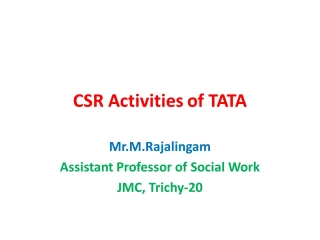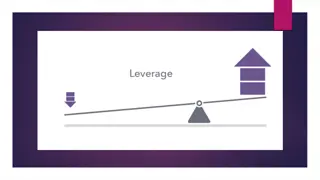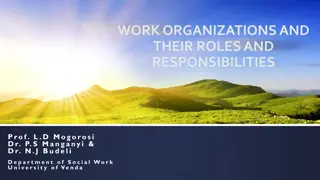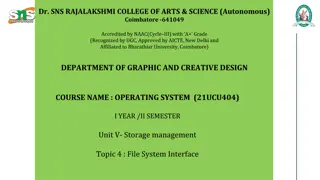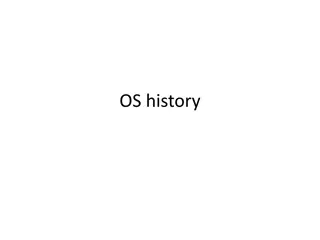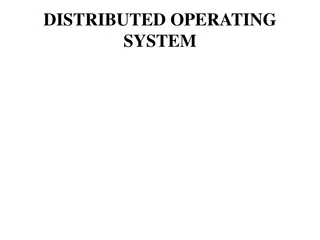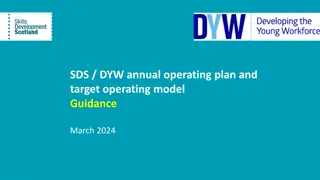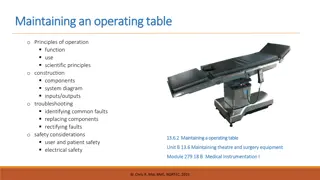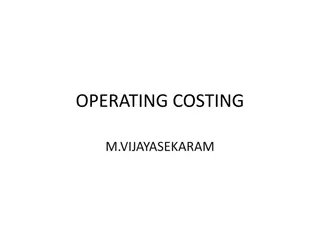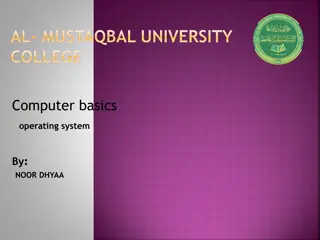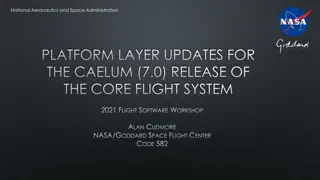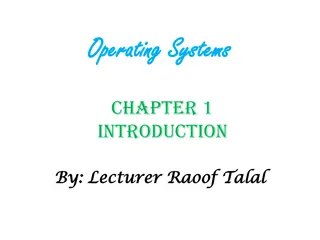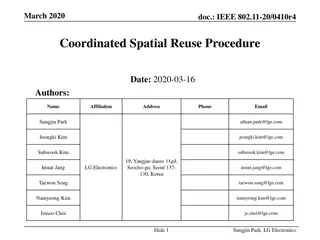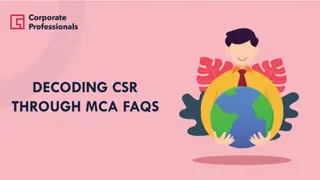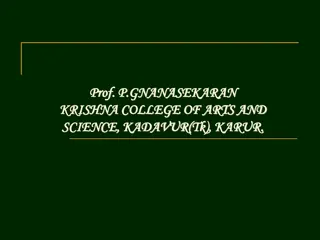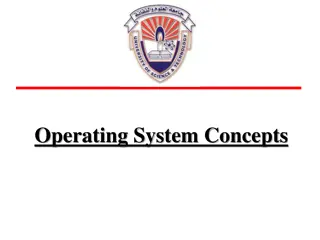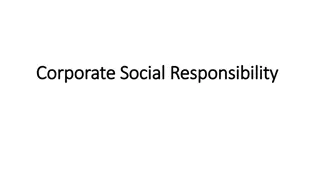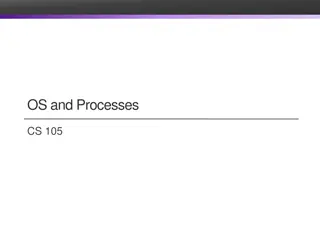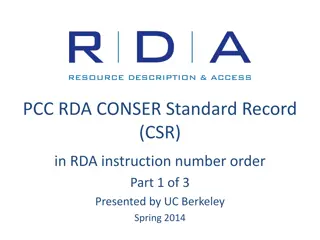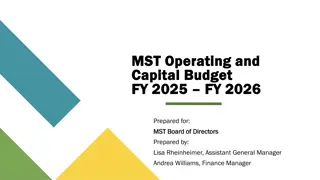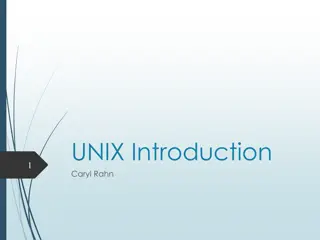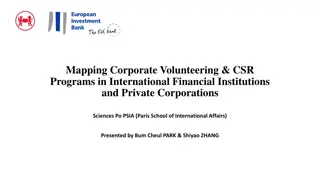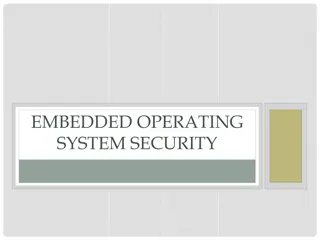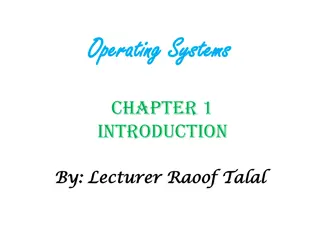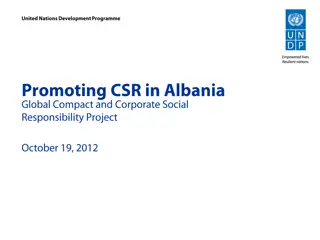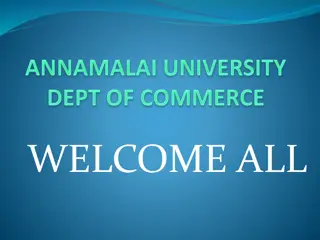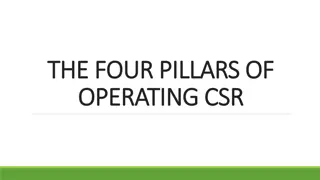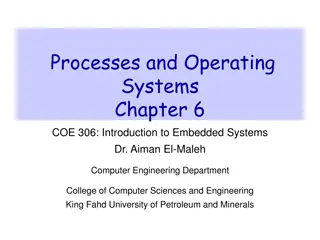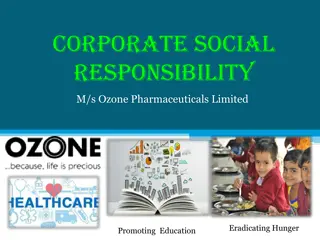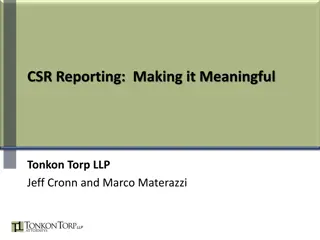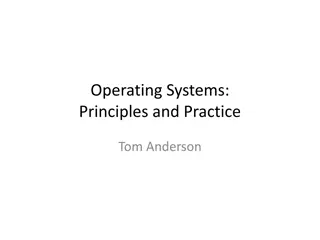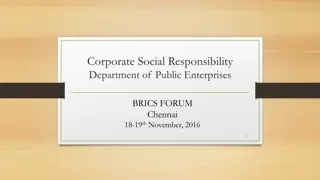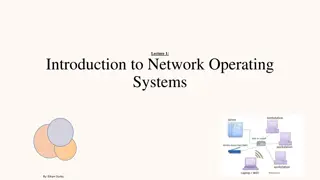CSR Activities of TATA
Explore the CSR initiatives of Tata Group, including support for self-help groups, social welfare organizations, healthcare projects, economic empowerment, pollution control, ecological balance, employment generation, and human capital development.
12 views • 13 slides
Understanding Leverage and Operating Leverage in Financial Management
Leverage in financial management refers to using assets or funds with fixed costs to analyze the impact of debt and equity mix on shareholder returns and risk. Operating leverage focuses on leveraging fixed operating costs to amplify profit changes with sales variations, measured by the degree of op
2 views • 6 slides
Analysis of Power Control for Coordinated Spatial Reuse in IEEE 802.11-24
Evaluation of power control schemes for Coordinated Spatial Reuse (CSR) in IEEE 802.11-24, comparing benefits with and without power control. Results show gains in throughput and SINR with different CSR schemes and considerations for shared access points. Concerns and insights shared on the effectiv
6 views • 24 slides
Operating Systems
An operating system is a crucial program that manages all other programs on a computer. It handles tasks like input recognition, file management, and device control. There are different types of operating systems such as single-user, single-task systems, multi-user, multi-task systems, real-time ope
6 views • 11 slides
Understanding Corporate Social Responsibility (CSR)
Definition of CSR, its importance, prime factors, need, and the argument for CSR in businesses are discussed in this presentation. CSR involves considering the impact of business activities on society and encompasses ethical, social, legal, and economic responsibilities. It is essential for reputati
7 views • 15 slides
WORK ORGANIZATIONS AND THEIR ROLES AND RESPONSIBILITIE
This presentation explores the roles and responsibilities of work organizations in South Africa, focusing on corporate social responsibility, community engagement, and corporate governance principles. It discusses the importance of institutions in higher learning and highlights key aspects such as C
0 views • 18 slides
Understanding File System Interface in Operating Systems
The file system interface is a crucial aspect of any operating system, providing users with a method for storage and access to data and programs. It comprises files for data storage and a directory structure for organizing and managing files within the system. File attributes like name, identifier,
0 views • 8 slides
Evolution of Operating Systems: From Mainframe Computers to Unix
Before the 1950s, users interacted directly with mainframe computers without an operating system, debugging using control panels. The transition to writing programs in symbolic languages led to the need for specific drivers. Run queues and operator-assisted job submissions marked this era. The first
0 views • 41 slides
Overview of Distributed Operating Systems
Distributed Operating Systems (DOS) manage computer resources and provide users with convenient interfaces. Unlike centralized systems, DOS runs on multiple independent CPUs and prioritizes software over hardware. It ensures transparency and fault tolerance, with a focus on software error handling.
1 views • 36 slides
SDS/DYW Annual Operating Plan and Target Operating Model Guidance - March 2024
This guidance outlines the development of an Annual Operating Plan and Target Operating Model (TOM) to enhance collaboration and improve outcomes for young people. It emphasizes aligning planning activities, co-designing learner experiences, and maximizing collective resources through strategic part
1 views • 9 slides
Maintaining an Operating Table: Principles and Functions
An operating table system comprises three components - the table column, table top, and transporter, each available in different versions for various surgical disciplines. Stationary tables are anchored to the floor, offering flexibility to adapt to patient needs. Mobile tables provide maneuverabili
0 views • 12 slides
Understanding Operating Costing in Service Industries
Operating costing is a method utilized by service-oriented businesses to ascertain the costs of providing services. Industries such as transportation services, welfare services, utility suppliers, and municipal services find operating costing beneficial. The method involves classifying costs into th
0 views • 6 slides
Understanding Operating Systems: Basics and Types
An operating system is essential software that manages a computer's hardware and software, allowing users to interact with the computer. Learn about the functions of an operating system, its importance, types available such as Microsoft Windows and macOS, and how they impact different devices. Disco
1 views • 11 slides
NASA Platform Layer Updates for the CAELUM (7.0) Release
The National Aeronautics and Space Administration (NASA) discusses platform layer updates for the CAELUM (7.0) release of the Core Flight System in the 2021 Flight Software Workshop. The platform layer consists of the Operating System Abstraction Layer (OSAL) and Platform Support Package (PSP), whic
1 views • 20 slides
Understanding Operating Systems: Introduction and Functions
An operating system plays a crucial role in managing computer hardware and facilitating user-computer interactions. It serves as an intermediary between users and hardware components, ensuring efficient resource allocation and control. The operating system coordinates the use of hardware resources b
5 views • 16 slides
Latest Amendments to CSR Activities Effective January 22, 2021
The latest amendments to CSR activities effective January 22, 2021 highlight what activities are not considered CSR, the definition of CSR activities, CSR policy requirements, administrative overhead guidelines, optional CSR committee constitution, and details regarding ongoing CSR projects. These a
0 views • 25 slides
Understanding IEEE 802.11-20/0410r4 Coordinated Spatial Reuse Procedure
This document presents the Coordinated Spatial Reuse (CSR) procedure in IEEE 802.11-20/0410r4, focusing on the transmission schemes and necessary information for effective spatial reuse. It outlines the topology of CSR environments, acquisition of information for CSR, CSR capability announcement by
8 views • 23 slides
Understanding CSR Compliance: Decoding MCA FAQs
Section 8 Companies and their profit distribution, net profit calculations under CSR, eligible CSR funds per Schedule VII, and clarifications on Administrative Overheads by MCA FAQs are covered in detail. Clear insights on CSR compliance requirements and calculations explained for better understandi
3 views • 45 slides
Understanding Operating Systems: Functions and Evolution
Operating systems are essential software that enable computers to function effectively by managing hardware resources and facilitating communication between applications and hardware. This article covers the basics of operating systems, their structure, evolution, functions, and types. It also explo
2 views • 23 slides
Understanding Operating System Concepts: Lecture Overview and Services
Exploring the lecture content on operating system concepts, structures, services, system calls, and file manipulation. Delve into the importance of operating system services, error detection, program execution, I/O operations, protection, security, and resource allocation in operating systems. Learn
4 views • 26 slides
Understanding Corporate Social Responsibility and Stakeholder Theory
Carroll's Four Faces of CSR model defines the economic, legal, ethical, and discretionary responsibilities of businesses towards society. The evolution of CSR concepts, stakeholder theory, and the importance of engaging with various stakeholders are discussed, emphasizing the intrinsic value of stak
0 views • 6 slides
Fleming College CSR Project: Reducing Paper Waste Successfully
The CSR project by Chetan Gupta, Harish Sivakumar, Paramvir Thind, and Gurinder Singh at Fleming College aimed to reduce paper waste through effective usage and proper disposal. By investing $30,000 annually, they managed to decrease paper usage significantly through awareness campaigns, behavior ch
0 views • 17 slides
Introduction to Operating Systems and Processes
In this informative content, we delve into the fundamental concepts of operating systems (OS) and processes. Operating systems are essential software that manage a computer's resources for users and applications. We explore the core functionalities of an OS, such as resource allocation, isolation, c
0 views • 41 slides
Understanding CONSER Standard Record (CSR) in RDA Instructions
Explore the principles behind CONSER Standard Record (CSR) in RDA instructions through UC Berkeley's training materials. Learn how to apply CSR and UC Berkeley policy statements to describe textual serials and integrating resources in various formats. Discover the differences between AACR2 rules and
0 views • 77 slides
MST Operating and Capital Budget FY 2025 Summary
The MST Operating and Capital Budget for FY 2025 focuses on maximizing revenues, increasing bus advertising rates, promoting transit services, seeking grants for capital projects, and maintaining stable staffing levels. The budget priorities also include operating a Better Bus Network at Board-adopt
0 views • 10 slides
Understanding UNIX Operating System
UNIX is a versatile operating system that enables multi-user access, multitasking, and portability across various computing environments. It serves as the foundation for many modern operating systems and has influenced concepts incorporated in Microsoft Windows and DOS. The UNIX system comprises dis
0 views • 51 slides
Corporate Volunteering & CSR Programs in Financial Institutions
This presentation explores the significance of corporate volunteering and CSR programs in international financial institutions and private corporations, emphasizing the benefits for both employees and communities. It covers the rising trend of corporate volunteering, the impact of volunteer grants,
0 views • 11 slides
Introduction to Linux: Course Overview and Objectives
This introduction to Linux course provides a comprehensive overview of operating systems, including the history, variations, user interface, and essential commands. The course is designed with lectures, labs, and exercises to help participants gain a better understanding of Linux and its practical a
0 views • 77 slides
Understanding Embedded Operating System Security
Embedded operating systems are designed for special purposes with limited resources and small sizes, found in various devices like ATMs, smartphones, cars, and more. Common operating systems include VxWorks, Windows, QNX, and SCADA, with different applications and requirements. Windows CE stands out
0 views • 21 slides
Understanding Operating Systems: An Introduction and Overview
An operating system is a crucial program that manages computer hardware and serves as an intermediary between users and hardware. This chapter explores the role of operating systems in a computer system, covering components like hardware, application programs, and users. It delves into how operating
0 views • 16 slides
Government of Albania Leading CSR Promotion Efforts
In Albania, the Government plays a pivotal role in advancing Corporate Social Responsibility (CSR) initiatives. The Department of Competitiveness, within the Ministry of Economic and Tourism Development, spearheads CSR coordination efforts. The government's mission involves fostering an enabling env
0 views • 7 slides
Corporate Social Responsibility: An Overview and Key Concepts
In this presentation by Prof. D. Ilangovan from Annamalai University, the concept of Corporate Social Responsibility (CSR) is explained in detail. The speaker emphasizes the need for companies to consider the impact of their actions on society as a whole. Key terms such as Pyramid of CSR, corporate
0 views • 18 slides
The Essential Pillars of Corporate Social Responsibility (CSR) Operating
Emphasizing liberal giving, purpose-driven actions, and valuing even the smallest efforts, the pillars of CSR, rooted in passages like 2 Corinthians, highlight the importance of genuine willingness, intentionality, and significance in contributing to the welfare of others.
0 views • 12 slides
Introduction to Processes and Operating Systems in Embedded Systems
Processes and operating systems play a crucial role in building complex applications on microprocessors, offering flexibility to meet timing requirements. The operating system (OS) manages processes by providing mechanisms for switching execution between them. Real-Time Operating Systems (RTOS) are
0 views • 65 slides
Ozone Pharmaceuticals Limited Corporate Social Responsibility Activities
Ozone Pharmaceuticals Limited has crossed the CSR threshold limit and is executing CSR funds for eradicating hunger and promoting education. The company's CSR committee has approved funds for activities aimed at societal betterment through Maa Madhuri Brij Varis Sewa Sadan Apna Ghar Sanstha. The imp
0 views • 9 slides
Understanding CSR Reporting and Its Significance in Business
Corporate Social Responsibility (CSR) reporting goes beyond profit generation, encompassing initiatives like community development and environmental protection. This article delves into the concept of CSR, communication strategies, reporting frameworks, reasons for engagement, industry standards, an
0 views • 15 slides
Understanding Operating Systems: Principles and Practice in CSE Curriculum
Dive into the world of operating systems through the lens of "Operating Systems: Principles and Practice" by Tom Anderson. Discover how this course fits in the UW CSE curriculum, covering systems programming, operating system interfaces, and distributed systems. Explore the project work on building
0 views • 21 slides
Corporate Social Responsibility Legislation in India - Overview
The Corporate Social Responsibility (CSR) legislation in India mandates companies, including CPSEs, to allocate a portion of their profits towards CSR activities. This legislation came into force in 2014, requiring eligible companies to spend at least 2% of their average net profits from the past th
0 views • 9 slides
An Overview of Network Operating Systems and Multitasking
This informative content discusses the services of network operating systems, multitasking concepts, essential components, client and server software elements, and network services. It explains the two forms of multitasking - preemptive and nonpreemptive - and their functions within operating system
0 views • 48 slides
Overview of Network Operating Systems and Their Features
Network operating systems are essential software that manage computer resources and provide services for programs. This lecture covers the types of computers in a network, features of operating systems such as process and memory management, disk and file systems, and networking capabilities. Underst
0 views • 27 slides
